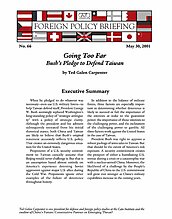When he pledged to do whatever was necessary–even use U.S. military forces–to help Taiwan defend itself, President George W. Bush seemingly replaced Washington’s long-standing policy of “strategic ambiguity” with a policy of strategic clarity. Although the president and his advisers subsequently retreated from his initial rhetorical stance, both China and Taiwan are likely to believe that Bush’s original statement accurately reflects U.S. policy. That creates an extremely dangerous situation for the United States.
Proponents of a U.S. security commitment to Taiwan casually assume that Beijing would never challenge it. But that is an assumption based almost entirely on America’s experience deterring Soviet aggression against major U.S. allies during the Cold War. Proponents ignore other examples of the failure of deterrence throughout history.
In addition to the balance of military forces, three factors are especially important in determining whether deterrence is likely to succeed or fail: the importance of the interests at stake to the guarantor power, the importance of those interests to the challenging power, and the inclination of the challenging power to gamble. All three factors work against the United States in the case of Taiwan.
President Bush was right to approve a robust package of arms sales to Taiwan. But that should be the extent of America’s risk exposure. A security commitment creates the prospect of either a humiliating U.S. retreat during a crisis or a catastrophic war with a nuclear-armed China. Moreover, the likelihood of a challenge by the People’s Republic of China to the U.S. commitment will grow ever stronger as China’s military capabilities increase in the coming years.

This work is licensed under a Creative Commons Attribution-NonCommercial-ShareAlike 4.0 International License.

